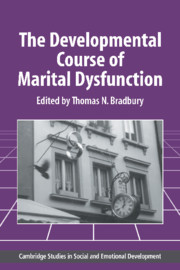Book contents
- Frontmatter
- Contents
- List of Contributors
- Foreword
- Introduction: The Developmental Course of Marital Dysfunction
- Part I Conceptual and Empirical Contributions
- 1 Communication in Early Marriage: Responses to Conflict, Nonverbal Accuracy, and Conversational Patterns
- 2 Marital Aggression, Quality, and Stability in the First Year of Marriage: Findings from the Buffalo Newlywed Study
- 3 Accommodation Processes During the Early Years of Marriage
- 4 The Psychological Infrastructure of Courtship and Marriage: The Role of Personality and Compatibility in Romantic Relationships
- 5 Happiness in Stable Marriages: The Early Years
- 6 Developmental Changes in Marital Satisfaction: A 6-Year Prospective Longitudinal Study of Newlywed Couples
- 7 The Development of Marriage: A 9-Year Perspective
- 8 Premarital Predictors of Relationship Outcomes: A 15-Year Follow-up of the Boston Couples Study
- 9 Optimizing Longitudinal Research for Understanding and Preventing Marital Dysfunction
- 10 Socialization into Marital Roles: Testing a Contextual, Developmental Model of Marital Functioning
- 11 Physical Aggression in Marriage: A Developmental Analysis
- Part II Invited Commentaries
- Author Index
- Subject Index
9 - Optimizing Longitudinal Research for Understanding and Preventing Marital Dysfunction
Published online by Cambridge University Press: 13 October 2009
- Frontmatter
- Contents
- List of Contributors
- Foreword
- Introduction: The Developmental Course of Marital Dysfunction
- Part I Conceptual and Empirical Contributions
- 1 Communication in Early Marriage: Responses to Conflict, Nonverbal Accuracy, and Conversational Patterns
- 2 Marital Aggression, Quality, and Stability in the First Year of Marriage: Findings from the Buffalo Newlywed Study
- 3 Accommodation Processes During the Early Years of Marriage
- 4 The Psychological Infrastructure of Courtship and Marriage: The Role of Personality and Compatibility in Romantic Relationships
- 5 Happiness in Stable Marriages: The Early Years
- 6 Developmental Changes in Marital Satisfaction: A 6-Year Prospective Longitudinal Study of Newlywed Couples
- 7 The Development of Marriage: A 9-Year Perspective
- 8 Premarital Predictors of Relationship Outcomes: A 15-Year Follow-up of the Boston Couples Study
- 9 Optimizing Longitudinal Research for Understanding and Preventing Marital Dysfunction
- 10 Socialization into Marital Roles: Testing a Contextual, Developmental Model of Marital Functioning
- 11 Physical Aggression in Marriage: A Developmental Analysis
- Part II Invited Commentaries
- Author Index
- Subject Index
Summary
The longitudinal literature on marriage, which consists of 115 studies, some 68 independent samples, and more than 45,000 marriages (Karney & Bradbury, 1995a), provides many important clues about how marriages succeed and fail, but it also contains many valuable lessons about how research in this domain can be improved. For example, whereas replicable associations between various marital processes and marital outcomes are beginning to emerge, conceptual frameworks for evaluating and integrating these findings remain to be developed. Whereas extensive progress has been made in assessing key independent variables, a number of methodological factors – such as specifying the samples and the dependent variables that are maximally informative for clarifying how marriages change – await further refinement. And whereas this literature already holds considerable promise for understanding and preventing marital dysfunction, its limitations have undermined its impact, and much of its promise therefore remains unfulfilled. Thus, despite its size and scope, this body of research has been overlooked (e.g., Hinde, 1995, p. 3, notes that longitudinal studies are “sadly neglected except in cases of parent–child relationships and studies of the effects of therapy or social support”) and underestimated (e.g., Gottman & Levenson, 1992, p. 221, note that “we know of only four prospective longitudinal studies that have attempted to predict future separation and divorce”).
- Type
- Chapter
- Information
- The Developmental Course of Marital Dysfunction , pp. 279 - 311Publisher: Cambridge University PressPrint publication year: 1998
- 50
- Cited by



